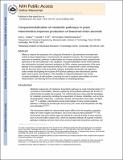Compartmentalization of metabolic pathways in yeast mitochondria improves the production of branched-chain alcohols
Author(s)
Stephanopoulos, Gregory; Avalos, Jose L.; Fink, Gerald R.
DownloadFink_Compartmentalization.pdf (2.817Mb)
OPEN_ACCESS_POLICY
Open Access Policy
Creative Commons Attribution-Noncommercial-Share Alike
Terms of use
Metadata
Show full item recordAbstract
Efforts to improve the production of a compound of interest in Saccharomyces cerevisiae have mainly involved engineering or overexpression of cytoplasmic enzymes. We show that targeting metabolic pathways to mitochondria can increase production compared with overexpression of the enzymes involved in the same pathways in the cytoplasm. Compartmentalization of the Ehrlich pathway into mitochondria increased isobutanol production by 260%, whereas overexpression of the same pathway in the cytoplasm only improved yields by 10%, compared with a strain overproducing enzymes involved in only the first three steps of the biosynthetic pathway. Subcellular fractionation of engineered strains revealed that targeting the enzymes of the Ehrlich pathway to the mitochondria achieves greater local enzyme concentrations. Other benefits of compartmentalization may include increased availability of intermediates, removing the need to transport intermediates out of the mitochondrion and reducing the loss of intermediates to competing pathways.
Date issued
2013-02Department
Massachusetts Institute of Technology. Department of Chemical Engineering; Whitehead Institute for Biomedical ResearchJournal
Nature Biotechnology
Publisher
Nature Publishing Group
Citation
Avalos, José L, Gerald R Fink, and Gregory Stephanopoulos. “Compartmentalization of metabolic pathways in yeast mitochondria improves the production of branched-chain alcohols.” Nature Biotechnology 31, no. 4 (February 17, 2013): 335-341.
Version: Author's final manuscript
ISSN
1087-0156
1546-1696